We understand the importance of a healthy mouth for your overall well-being. We believe that everyone deserves to have healthy teeth and gums, not only for a great smile and fresh breath but also for the ability to eat, speak, and express themselves with confidence.
Unfortunately, numerous common dental issues can have a significant impact on both our oral and overall health. Dental problems such as gum disease, crooked teeth, bad breath, toothache, etc, are most prevalent today, but they are also easily treated.
This article will explain dental problems, why they matter, and how to maintain a healthy smile.
What Are Dental Problems?
Dental issues encompass a wide range of concerns that can affect the health of your teeth and overall oral well-being. These common problems include cavities, gum disease, tooth sensitivity, and oral infections.
According to the Centers for Disease Control and Prevention (CDC), nearly 9 out of 10 Americans have had at least one cavity by age 19, and gum disease affects nearly half of all adults aged 30 and older.
Having problems with your oral health can substantially impact your health, relationship with other people, and overall well-being. Despite knowing this, many people underestimate the significance of dental health.
The Dangers of Dental Problems
Dental problems extend beyond oral discomfort and aesthetics; they can lead to more serious health issues. Untreated dental problems have been linked to conditions like cardiovascular disease and diabetes. Infections in the mouth can affect other parts of the body, emphasizing the importance of oral health for overall well-being.
Dental problems, if left unchecked, can hinder daily activities. Difficulty in chewing and speaking and the potential for chronic pain can significantly impact your quality of life.
Also, ignoring dental issues may lead to more extensive and costly treatments down the line. Addressing problems early preserves your health and can save you from significant financial burdens.
Common Dental Problems
Our teeth play a crucial role in our daily lives, enabling us to eat, speak, and smile confidently. However, like any part of our body, our teeth are susceptible to a variety of problems that can affect our oral health and overall well-being.
Knowing the common dental problems and their causes can help us take preventive measures and maintain a healthy smile.
Here are some of the most common dental problems:
Tooth Decay (Cavities)
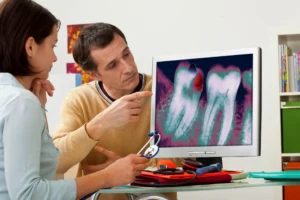
This is the breakdown of tooth enamel, the hard, protective outer layer of our teeth. This breakdown is caused by acids produced by bacteria in plaque, a sticky film that builds up on our teeth. Cavities can cause pain, sensitivity, and tooth loss if left untreated.
The early stages of cavities can be treated with dental fillings, while in advanced cases, root canals or dental implants save the tooth.
Gum Disease (Periodontal Disease)
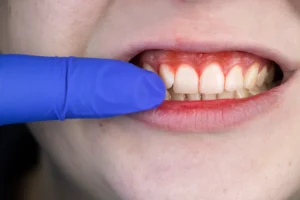
Gum disease is an infection of the gums and supporting tissues surrounding our teeth. It is caused by plaque buildup that irritates and inflames the gums. Periodontal disease can lead to receding gums, tooth loss, and even serious health problems if left untreated.
Bad Breath (Halitosis)

Bad breath, medically known as halitosis, is an unpleasant odor from the mouth. Halitosis is commonly caused by poor oral hygiene, food particles trapped between teeth, dry mouth, or underlying medical conditions.
Sensitive Teeth

Sensitive teeth occur when the dentin, the layer of tissue under the tooth enamel, is exposed. This can cause pain or discomfort when exposed to hot, cold, sweet, and acidic foods and beverages.
Cracked or Broken Teeth
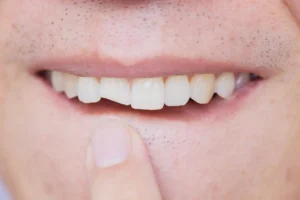
Cracked teeth can result from trauma, such as biting down on hard objects or grinding teeth. They can also be caused by weakened tooth enamel due to decay or wear and tear.
Receding Gums

Receding gums takes place when the gum tissue around the teeth pulls away, exposing more of the tooth root. This can make the teeth appear longer and more sensitive.
Root Infection

A root infection, also known as a periapical abscess, is an infection of the tissue at the tip of the tooth root. It can cause pain, swelling, and sensitivity.
Enamel Erosion
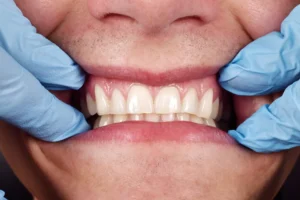
Enamel erosion is the gradual loss of tooth enamel due to acidic substances, such as citrus fruits, carbonated drinks, and stomach acid reflux. It can make the teeth appear dull, translucent, and more sensitive.
Teeth Grinding

Teeth grinding, also known as bruxism, is the involuntary clenching and grinding of teeth, usually during sleep. It can cause tooth wear, jaw pain, and headaches.
These common dental problems can be prevented or managed through regular dental checkups, proper oral hygiene, and a healthy diet.
How to Avoid Dental Problems and Maintain Your Healthy Smile
A radiant smile goes beyond aesthetics; it reflects good oral health. Adopting proactive dental care practices is essential to maintain that healthy and confident smile. From daily oral hygiene routines to mindful dietary choices, a few simple steps can pave the way for a lifetime of strong teeth and gums.
To maintain a healthy smile and prevent dental issues:
- Brush your teeth twice daily with fluoride toothpaste to remove plaque and bacteria.
- Floss after meal to remove plaque and debris between teeth and along the gumline.
- Schedule routine dental checkups and cleanings to catch issues early and ensure professional cleaning.
- Eat a well-balanced diet rich in vitamins and minerals while limiting sugary snacks and beverages that can contribute to tooth decay.
- Drink plenty of water, as it helps rinse away food particles and maintains saliva production, which aids in neutralizing acids.
- Avoid smoking, as this can contribute to gum disease and oral cancer.
- Protect your teeth during sports by wearing a mouthguard.
- Limit alcohol consumption, as excessive alcohol can contribute to oral health problems.
How Can Dental Implants Help Mitigate Dental Problems?
Dental implants are a revolutionary solution for replacing missing teeth and restoring oral health. They offer a permanent, natural-looking, functional replacement for lost teeth, effectively addressing many dental problems.
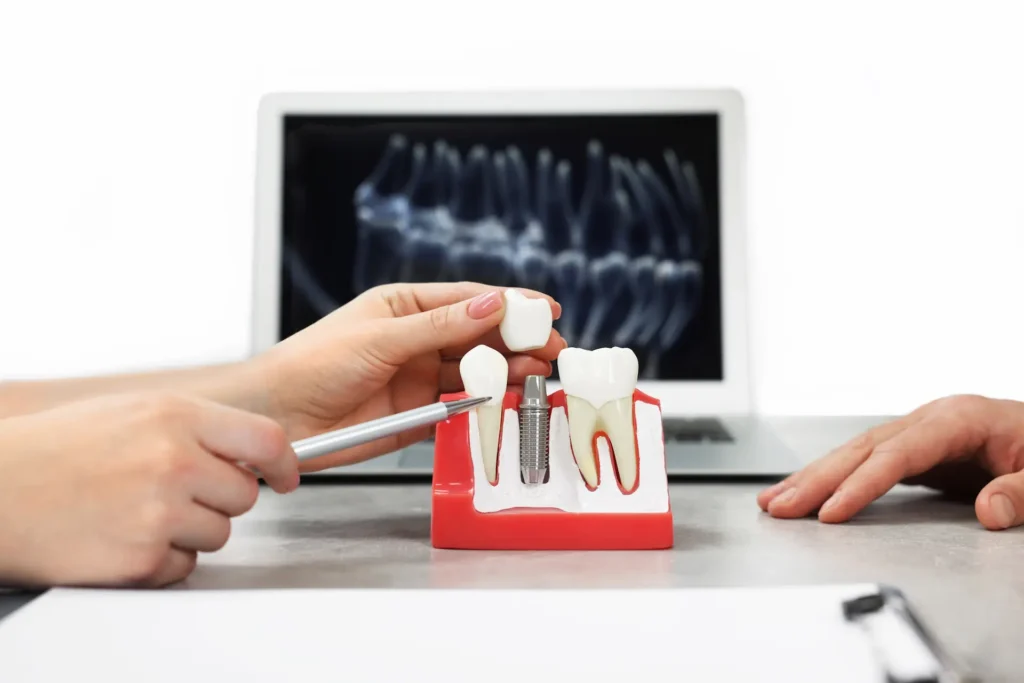
Dental implant offers a comprehensive solution to missing teeth
Missing teeth, whether due to decay, periodontal disease, trauma, or other causes, can significantly impact oral health and overall well-being. The gaps left by missing teeth can cause neighboring teeth to shift, leading to misalignment, increased stress on remaining teeth, and, ultimately, tooth loss. Additionally, missing teeth can affect chewing ability, speech, and self-confidence.
Dental implants help prevent further dental issues
Dental implants replace missing teeth and play a crucial role in preventing further dental problems. By filling the gaps left by missing teeth, dental implants prevent neighboring teeth from shifting, reducing the risk of misalignment and tooth loss. Furthermore, dental implants stimulate bone growth and preserve jawbone structure, preventing bone loss and facial collapse.
Dental implants help to maintain oral health
Dental implants contribute significantly to maintaining good oral health. Their stability and functionality allow for effective chewing and cleaning, reducing the risk of plaque buildup, gum disease, and cavities. Dental implants closely resemble natural teeth, making it easier to maintain proper oral hygiene practices.
Dental implants are a holistic approach to dental care
Dental implants offer a comprehensive approach to dental care when combined with regular dental checkups and proper oral hygiene practices. By addressing missing teeth, preventing further dental problems, and promoting oral health, dental implants contribute to overall well-being and enhance quality of life.
Let Hanna Dental Implant Center Help Treat Your Dental Problems
A healthy smile is essential for self-confidence, general health, and a high quality of life. At Hanna Dental Implant Center, we can help you maintain your oral health and prevent common dental problems affecting your well-being.
Don’t hesitate to contact us if you notice any signs of dental issues, such as tooth decay, gum disease, or bad breath. We can provide prompt treatment and help you restore your smile.
We have the latest dental implant solutions in Houston, Texas, to promptly address any damaged or infected teeth. Don’t wait—your smile deserves the care it needs today for a healthier tomorrow. Schedule at no-cost consultation and take the first step towards having a confident smile today!
Frequently Asked Questions
What are the five most common dental problems?
The top five common dental problems include cavities and tooth decay, gum disease, tooth loss, dental abscess, and oral cancer. Recognizing these issues early allows for prompt intervention and effective treatment.
What are the causes of dental disease?
Dental diseases often result from poor oral hygiene, sugary diets, and neglecting regular dental checkups. Genetics, smoking, and certain medical conditions can also contribute. Adopting good oral hygiene practices and a healthy lifestyle helps prevent dental problems.
What are the problems related to teeth?
Common problems related to teeth include cavities, tooth decay, gum disease, tooth loss, and dental abscess. These issues can impact oral health and, if left untreated, lead to broader health concerns.
What are the signs of an unhealthy mouth?
Signs of an unhealthy mouth include persistent bad breath, toothaches, bleeding gums, and changes in tooth color or sensitivity. Regular dental checkups help identify these signs early for timely intervention.



